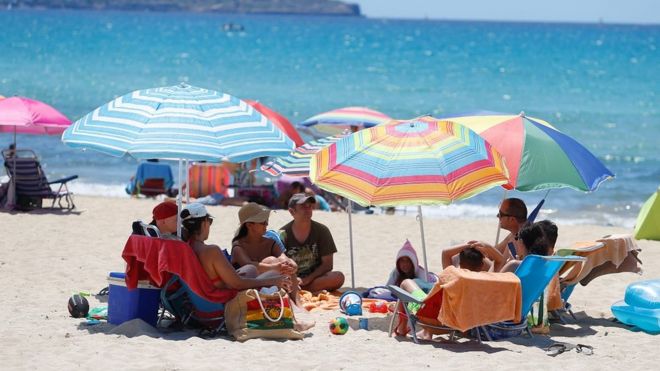Overseas visitors have begun arriving in Spain once more as the country reopens its borders and the three-month state of emergency declared in response to the coronavirus pandemic comes to an end.

As the second most-visited country in the world, Spain is desperate to reactivate its vital tourism sector as soon as possible. The government has launched a publicity campaign – called Spain for Sure – in a bid to reassure visitors and fire up the industry, which makes up about 12% of the country’s GDP.
On Sunday, Spain opened its borders to EU countries and others also in the Schengen area. From 1 July, visitors from so-called “third countries” will be allowed back to Spain, and Portugal will also open its land border with Spain on the same day.
Much will depend on the return of UK tourists, who make up the largest national group among Spain’s foreign visitors.
On Saturday evening, the Spanish government announced that British visitors would not need to undergo a mooted 14-day quarantine on arrival, and called on the UK government to show reciprocity.
Although the Madrid government had previously said it was considering a two-week quarantine for UK visitors in response to Britain’s decision to require all international arrivals to self-isolate for 14 days, the foreign minister said Britons would be welcomed back to Spain with no restrictions.
“We will allow British visitors to enter Spain just like the rest of the European Union as from 21 June – freely and without the need for a quarantine,” Arancha González Laya told BBC News.
“We’re discussing with the UK authorities to see if they would do the same on their side. We nevertheless are doing this out of respect for the 400,000 British citizens that have a second residence in Spain and are dying to benefit from their homes in our country.”
The foreign minister said she hoped the British authorities would also be “sensitive to the 250,000 Spaniards that are also living in the UK and would like to enter the UK without a quarantine”.
The Foreign Office, however, is still advising British nationals against all but essential international travel.
Until now, people visiting Spain from abroad have been obliged to undergo a 14-day quarantine, but the requirement lapsed at midnight on Saturday when the state of emergency ended.
Instead, those arriving will have their temperatures taken at the airport, undergo a visual assessment, and will be asked to provide their contact details.
The first groups of visitors began arriving at Madrid’s Adolfo Suárez airport in the district of Barajas on Sunday morning. The airport’s arrivals hall was decked with stickers to remind people to observe social distancing measures.
“It’s very strange, because we aren’t used to travelling anymore,” an Italian tourist on a flight from Bergamo told Reuters.
Earlier this week, the government unveiled a €4.3bn (£3.9bn) plan intended to restore confidence in Spain as a safe destination, improve its competitiveness and boost its image abroad.
“Spain is opening up for tourism again,” the prime minister, Pedro Sánchez, said on Thursday.
“We are world leaders and that’s why every step we take will be a safe step. Through prudence and responsibility we will show that Spain is a safe and healthy destination.”
The Spanish hotel owners association, Cehat, has called on the socialist-led coalition government to help the country’s hospitality industry recover from the losses inflicted by the pandemic.
“Spain’s tourist sector is an industry that brings nothing but joy to our country and our economy,” the association’s director, Jorge Marichal, told MPs on Monday.
Spain coronavirus death rate graphic
“It is the biggest generator of employment after the public sector, it distributes wealth, contributes to Spain’s image, improves our foreign relations, helps conserve our heritage and countryside, and helps other sectors such as agriculture and manufacturing.”
Although the state of emergency has ended and Spaniards are now free to travel within the country, masks will remain mandatory in public places when physical distancing of at least 1.5 metres is not possible.
The state of emergency, which was declared on 14 March, led to one of the strictest lockdowns in Europe and was intended to prevent the collapse of stressed and overstretched intensive care units across the country.
The prime minister has warned people not to take Spain’s hard-won recovery for granted.
“We can’t lower our guard,” Sánchez said in an address to the nation on Saturday.
“We need to keep it up, and we need to keep on following the hygiene and protection rules with the same sense of personal responsibility we’ve seen up until now. We can all be either a wall against the virus or the means of its transmission. It depends on each and every one of us.”
To date, Covid-19 has killed 28,322 people in Spain and infected 245,938.



